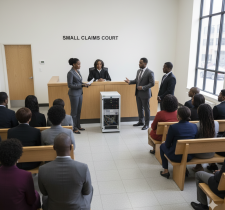Bodies Governing Intellectual Property in Kenya
Kenya has several institutions responsible for the protection and enforcement of intellectual property rights (IPRs). These bodies play a crucial role in ensuring that creators, inventors, and businesses can protect their innovations and benefit from their intellectual property.
1. Kenya Industrial Property Institute (KIPI)
What is KIPI?
The Kenya Industrial Property Institute (KIPI) is a government agency under the Ministry of Industrialization, Trade, and Enterprise Development. It was established on May 2, 2002, following the enactment of the Industrial Property Act, 2001.
Functions of KIPI
KIPI is responsible for:
✔ Administering industrial property rights in Kenya.
✔ Providing technological information to the public.
✔ Promoting innovation and inventiveness in Kenya.
✔ Offering training on industrial property.
Intellectual Property Rights Protected Under KIPI
KIPI protects four main elements of industrial property:
✔ Patents
✔ Utility Models
✔ Industrial Designs
✔ Technovations
KIPI also administers the Trademarks Act (Cap 506), which governs the registration of Trade and Service Marks.
Regional and International Collaboration
KIPI facilitates regional and international protection of intellectual property through:
✔ African Regional Industrial Property Organization (ARIPO) – A regional body of 12 African nations where inventors can apply for IP protection across multiple countries.
✔ World Intellectual Property Organization (WIPO) – Administers the Patent Cooperation Treaty (PCT), which allows for international patent registration.
2. Kenya Copyright Board (KECOBO)
What is KECOBO?
The Kenya Copyright Board (KECOBO) is a State Corporation under the Ministry of Youth Affairs, Sports, and the Arts. It was established under Section 3 of the Copyright Act, 2001, to administer and enforce copyright and related rights.
Functions of KECOBO
KECOBO is responsible for:
✔ Overseeing legislation on copyright and related rights.
✔ Conducting training and awareness programs on copyright.
✔ Informing and educating the public on copyright matters.
✔ Licensing and supervising Collective Management Organizations (CMOs).
✔ Maintaining a databank of authors and their works.
Copyright Protection in Kenya
Copyright protection is automatic once a work is in a tangible form, meaning registration is not required for copyright to be valid. However, KECOBO has developed the National Rights Registry Portal, which allows authors and artists to voluntarily register their works and obtain certificates as proof of ownership.
3. Kenya Plant Health Inspectorate Services (KEPHIS)
What is KEPHIS?
KEPHIS is the government agency responsible for the protection of plant breeders’ rights (PBRs) in Kenya. It ensures that breeders receive exclusive rights to their new plant varieties under the Seeds and Plant Varieties Act.
Functions of KEPHIS
✔ Protects intellectual property rights of plant breeders.
✔ Regulates the use, import, and export of plant materials.
✔ Ensures quality control for seeds and plant varieties.
Plant breeders seeking to commercialize new plant varieties can apply for Plant Breeder’s Rights (PBRs) through KEPHIS.
4. Anti-Counterfeit Authority (ACA)
What is ACA?
The Anti-Counterfeit Authority (ACA) is a State Corporation under the Ministry of Investments, Trade, and Industry. It was established under the Anti-Counterfeit Act, 2008, and began operations in June 2010.
Functions of ACA
ACA is responsible for:
✔ Combating counterfeiting and trade in counterfeit goods.
✔ Raising awareness on the dangers of counterfeit products.
✔ Training stakeholders on anti-counterfeiting measures.
✔ Coordinating with regional and international bodies in the fight against counterfeits.
IP Recordation System
To combat counterfeiting more effectively, ACA has introduced the Intellectual Property Recordation System. Brand owners can now register their IP rights with ACA, making it easier to monitor and prevent the importation of counterfeit goods into Kenya.
Conclusion
The protection of intellectual property is crucial for economic growth, innovation, and the creative industry in Kenya. Institutions like KIPI, KECOBO, KEPHIS, and ACA play a key role in securing intellectual property rights, preventing infringement, and supporting innovation. By understanding the role of these organizations, creators and businesses can better protect their intellectual property and maximize its value.







